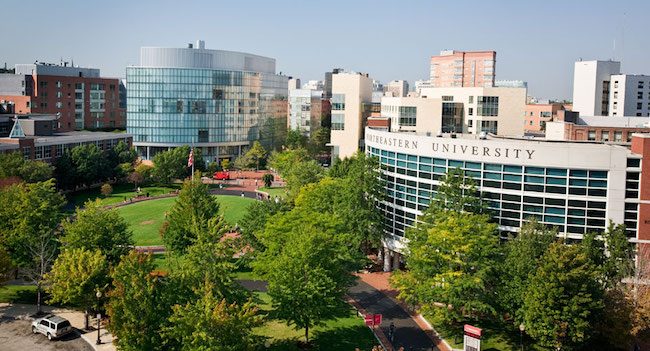Matthew Connolly started working in e-commerce when he was 14 years old. He built his own business from the ground up, using his garage at his childhood home in Troy, New York as a warehouse to resell grocery coupons and brand-name athletic gear. The experience grew out of an early interest in supply chain management, and when he’d grown a little older Connolly applied to over 20 colleges to study business, ultimately choosing Northeastern University in Boston, Massachusetts.
Connolly chose Northeastern, he says, not only because it offered him a full-ride scholarship but because of its co-op opportunities and departure from traditional practices, with a heavy focus on entrepreneurial and creative instincts. “I was not someone who wanted to go to college and change my major a bunch of times,” he says. “I wanted to get the most out of the experience and be impressive and land a job after I graduate.”
THE CO-OP EXPERIENCE AT NORTHEASTERN
Northeastern’s D’Amore-McKim School of Business curriculum requires students seeking an undergraduate degree to take two courses aimed at preparing them to run a successful co-op in the professional world. As freshmen, students take Planning for Business Co-op and Careers, and as sophomores they take Professional Development for Co-op.
Northeastern’s co-op program is more than 100 years old and has established relationships with more than 2,500 employers across the U.S. and in 80 countries. Each year 55% to 65% of students are offered a job as a result of their co-ops, says Mary Kane, assistant dean cooperative education at D’Amore-McKim.
“What truly makes co-op at Northeastern unique is that it is an integrated part of our academic program.” Kane says. “When the students go out on their various co-ops and return to school, their experiences are brought directly back into the classroom.”
Northeastern invites guest speakers, alumni, and upperclassmen to visit with first- and second-year business students to help guide them through their first co-op. Each student is assigned a co-op adviser who assists students in understanding proper coaching and training for job interviews, building a resume, and selecting the right job for each student. “The advisers also refer appropriate students to employers who meet their hiring needs, facilitate the interview process both on-campus and at the various companies, and assist with on-campus branding, marketing, and career education activities,” Kane says.
CO-OP FROM A STUDENT’S PERSPECTIVE
In many ways Connolly is the ideal candidate for the co-op model of learning. The company he started as a teen evolved, around his freshman year, into M13Y. “Before then I was selling anything I could find. But I didn’t have any relationships with wholesale vendors; my mindset was, ‘What can I find at retail and sell?’ That’s also when I started transitioning from selling on eBay to selling on Amazon,” Connolly says. “I decided to refocus and start going for wholesale relationships where I could move a lot of one product in bulk. I partnered with a warehouse in Michigan. The four main pillars we have today are Gatorade, restaurant supplies, Jelly Belly, and recycled wine corks used mainly for crafting.”
Because of his familiarity with Amazon, Connolly sought his co-op experience as a financial analyst with the Amazon e-commerce platform co-op in Seattle, Washington. He was accepted. At Amazon, he worked on a team that managed internal technology procurement. He spent six months working full-time and at the end of his internship was asked to complete a project to be presented to the entire team.
“We actually use Fulfillment by Amazon at M13Y, so when I started working there on co-op, it was really interesting, because I got to see the back end of things, visit the warehouse, and understand how all of Amazon’s automated services work,” Connolly says.













Questions about this article? Email us or leave a comment below.